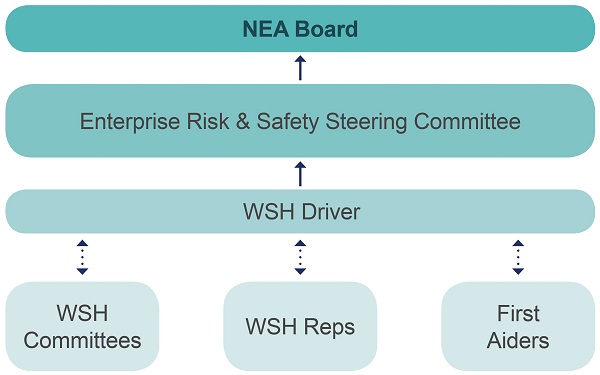About WSH
WSH is managed by a network of stakeholders across the organisation, and reports to a cross-Divisional Enterprise Risk and Safety Steering Committee. The committee looks at WSH performance, strategic and systemic interventions, and WSH capability- and culture-building.
WSH Governance Structure

Monitoring Incidents
From January to December 2020, there were 21 minor workplace injuries in NEA, the most common incident being slips, trips and falls. Incidents were investigated and reported, and learnings were shared across the organisation in a timely manner. There were no workplace fatalities or occupational diseases reported in 2020.
Type of WSH Incidents in 2020
| Type of Incident | Count |
| Slips, trips and falls | 16 |
| Aggression towards public officers | 1 |
| Fell from height | 1 |
| Over-exertion | 1 |
| Striking against objects | 1 |
| Traffic accident | 1 |
| Total | 21 |
Incentivising Good Safety Habits
Aside from monitoring workplace injuries, NEA incentivises holistic WSH performance with internal WSH Scoreboard Awards for low incident rates, strong WSH programmes and innovation, and safe work practices. At the national level, NEA attained 3 certificates of commendation for the WSH Awards in 2020. Two supervisors, Mr Phua Kim Tian and Mr Mohamed Shah Al-Nawaz were recognised for their efforts in promoting WSH. The Tuas South Incineration Plant team was recognised for their WSH innovation in modifying the design of the vibrating conveyor system to enhance the safety of maintenance work.
Safety During COVID-19
To keep our workforce safe during the COVID-19 pandemic, NEA put in place a Safe Management System comprising three aspects – Risk Management, Surveillance and Staff Awareness. A range of Safe Management Measures (SMMs) were swiftly introduced in 2020, including split team arrangements, contact tracing, safe distancing reminders and provision of hand sanitisers at high touchpoints. 80 Safe Management Officers were also appointed to ensure compliance with SMMs at all NEA work premises, and employees were kept abreast of the latest guidelines through advisories and weekly staff communications. The above played a significant role in safeguarding the health of employees, and mitigating the risks of COVID-19 transmission at the workplace.
Mental Wellness
For mental well-being, NEA also provides platforms and resources to help staff cope, especially during the pandemic. We shared mental wellness tips through regular emailers, organised lunchtime talks, sent care packages to all staff, and informed staff of the available platforms they could reach out to for support, such as the counselling hotline.